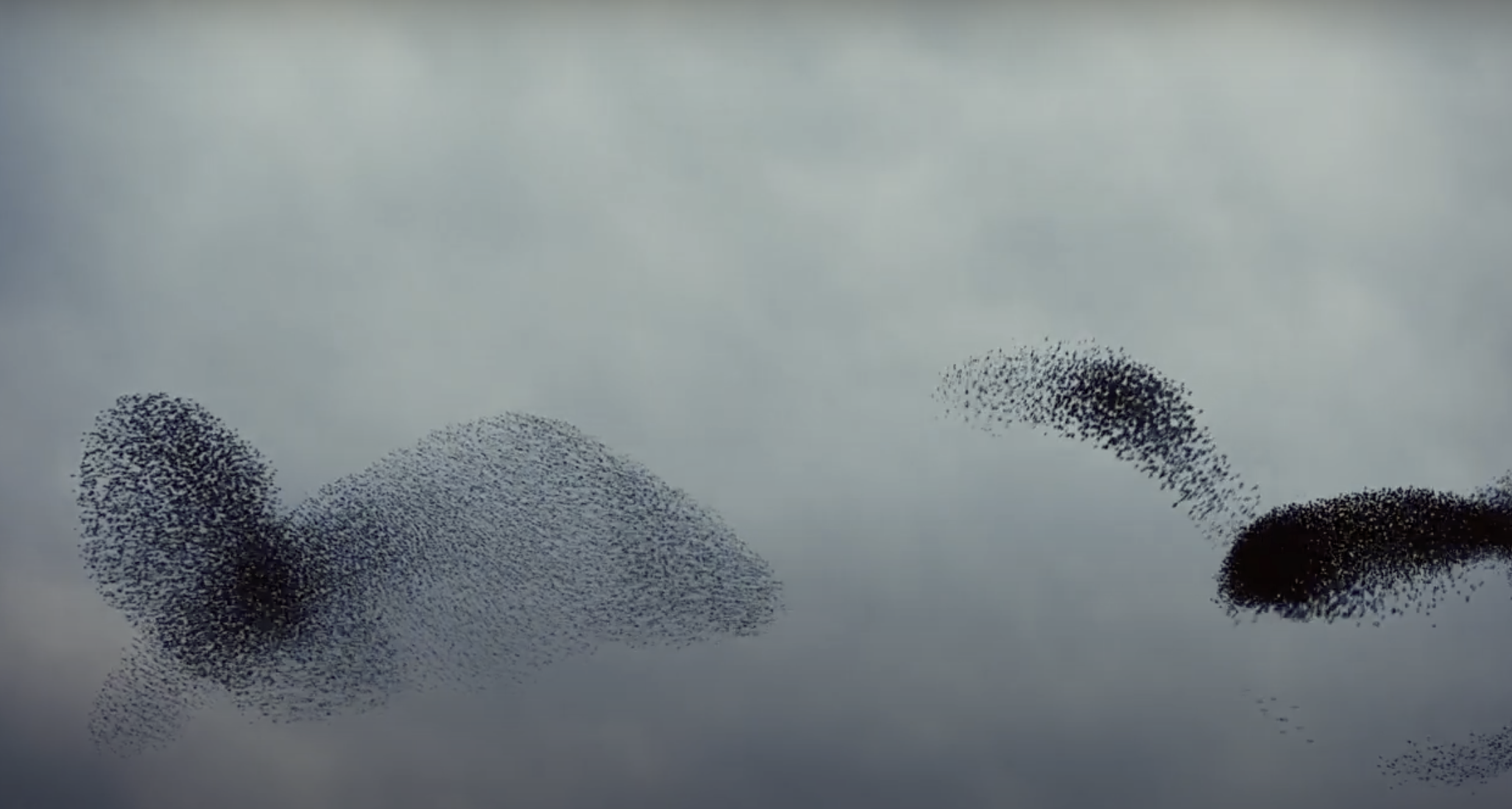
Events & Dialogues
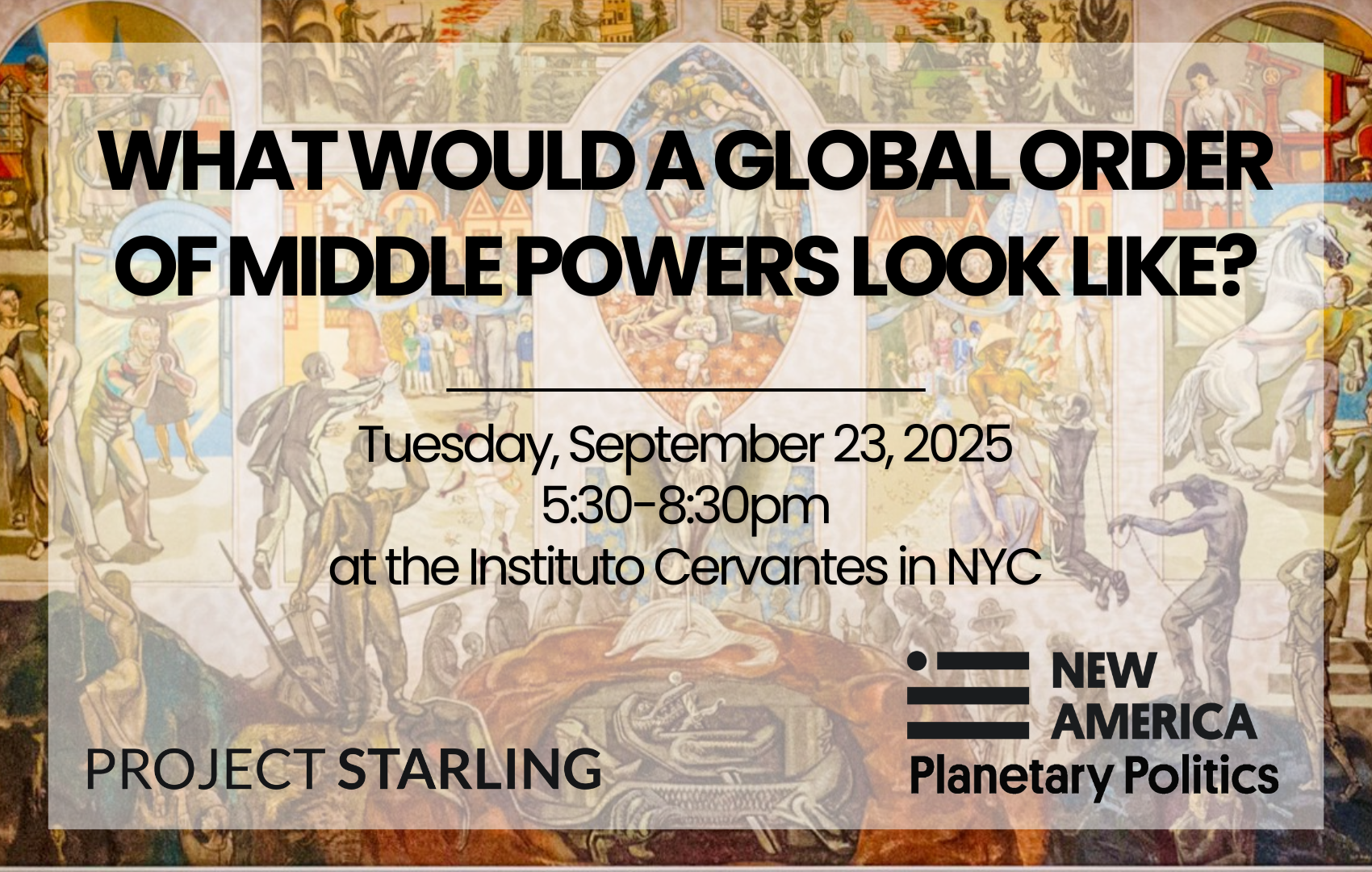
What Would a New Global Order Look Like?
“What Would a Global Order of Middle Powers Look Like?”
Conversation & Garden Reception
at the Instituto Cervantes
On Tuesday, September 23, 2025, New America and Project Starling hosted an exciting conversation during United Nations High-Level Week.
We explored three central questions. What would it mean to re-imagine a new global order? Should a reimagined order be based on shared values? What are the near coalitions that need to happen?
The conversation will kick off with brief opening provocations, or 'lightning talks' by Martín Abregú, Vice President of International Programs at the Ford Foundation; Amitabh Behar, Executive Director of Oxfam International; Richard Gowan, UN and Multilateral Diplomacy Director at the International Crisis Group; Kate Higgins, CEO of Cooperation Canada; Stewart Patrick, Senior Fellow and Director of the Global Order and Institutions Program at the Carnegie Endowment for International Peace, Zane Dangor, Director General of the Department of International Relations and Cooperation, South Africa, and Mariana Mazzucato, Professor of Economics of Innovation and Public Value, University College London.
The discussions offered some important insights:
There was broad agreement that the time for action is now and that the current multilateral system is approaching a breaking point. That said, we are still lacking a clear blueprint on how to shape the future toward the system we want to see.
Regaining public support for multilateralism will require concrete steps to tackle real issues and address the economic insecurity felt by so many while demonstrating the centrality of global cooperation to a promising future.
It is time for middle powers to step up. After 80 years of waiting for great powers to lead, there is a space, with great powers unable or unwilling, to break the mold and act.
Reform the current system rather than try to rebuild it from scratch. Middle power leadership requires a functioning multilateral system. There is opportunity to build upon what exists and shape institutions that support a promising future.
Build a coalition of the willing. The moment calls for a flexible network of states, united by both trust and self-interest, that are ready and capable to step up.
Hold principles to account. As we rethink the system, equity, solidarity, and sustainability must be central.
Peace and Security remains challenging. Without the active engagement of the great powers, middle powers will likely find an international security system difficult to maintain
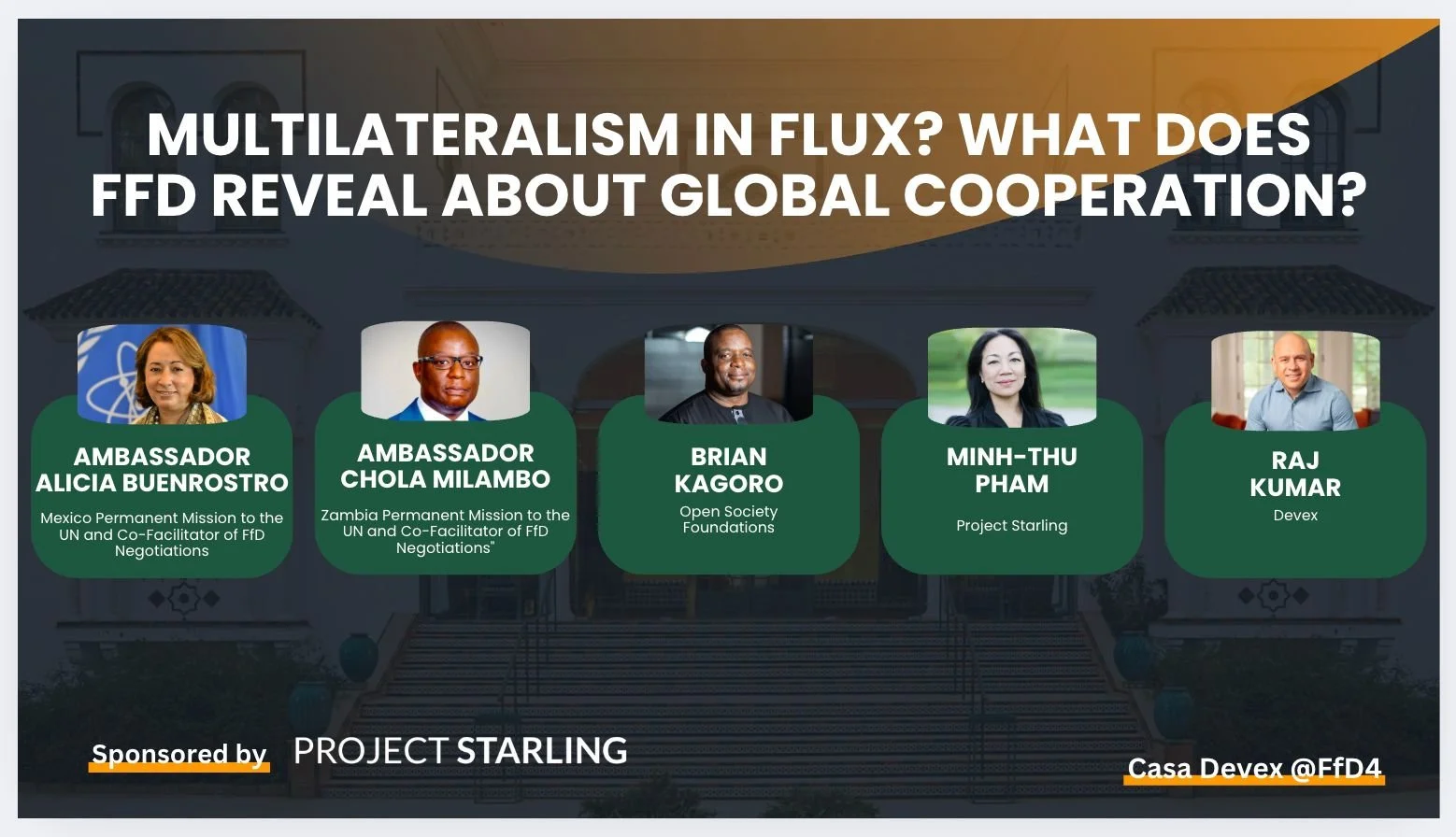
Multilateralism in Flux? What Does the FFD Outcome Reveal About Global Cooperation?
The road to the Compromiso de Sevilla outcome of the 4th International Conference on Financing for Development (FFD4) offers a window into multilateralism today and where it’s going. Are we witnessing a recalibration or a fundamental reshaping of how nations collaborate — and how do we harness this moment for change?
Project Starling & Devex held an important conversation on what FFD4 says about the state of multilateral cooperation. The event took place at Casa Devex (Villa Luisa) in Sevilla, Spain on June 30, 2025 on the sidelines of the United Nations FFD conference.

Strengthening the Narrative for ODA and Beyond: FfD Prep Comm Side Event
Project Starling’s Side Event during the 3rd Preparatory Committee of the Financing for Development Process

Shifting Power: Bold Strategies for a New Era of Global Collaboration
The unprecedented convergence of challenges facing global governance today demands bold and transformational responses. Amid growing great power competition, the rise of new actors, rapidly advancing technology, and outdated institutions, the system often appears stagnant and inflexible. Yet, our institutions are constantly evolving. Power structures shift, new players emerge, and innovative ideas can take root. The outcomes of the Summit of the Future demonstrate that global collaboration can still deliver for people and the planet.
Project Starling, New America, the International Crisis Group and CIFF are hosting an exciting conversation to explore solutions that can meet this unique moment in history. We will discuss emerging responses and collaborative strategies to address today’s political, environmental, and social challenges.
Shifting Power: Bold Strategies for a New Era of Collaboration
5:00pm – 6:15pm
This panel discussion will explore opportunities to shift power to those most affected by global governance decisions. Our featured speakers are leading efforts that can help address today’s political, environmental, and social challenges and work towards a multilateral system that can deliver:
Mark Malloch Brown, former UN Deputy Secretary-General
Elissa Jobson, Chief Advocacy Officer, International Crisis Group
Brian Kagoro, Managing Director, Programs, Open Society Foundations
Joseph Ng’ang’a, Vice-President for Africa at the Global Energy Alliance for People and Planet and CEO of the inaugural Africa Climate Summit
Anne-Marie Slaughter, President & CEO of New America
Minh-Thu Pham, CEO, Project Starling (moderator)
Garden Reception to Celebrate the Work Ahead
6:15 pm – 8:00 pm
To continue the conversation, please join us for an evening reception immediately following the panel in the adjacent garden. We hope to gather friends new and old to connect as we prepare for the work ahead. This event also marks Project Starling’s one year anniversary.
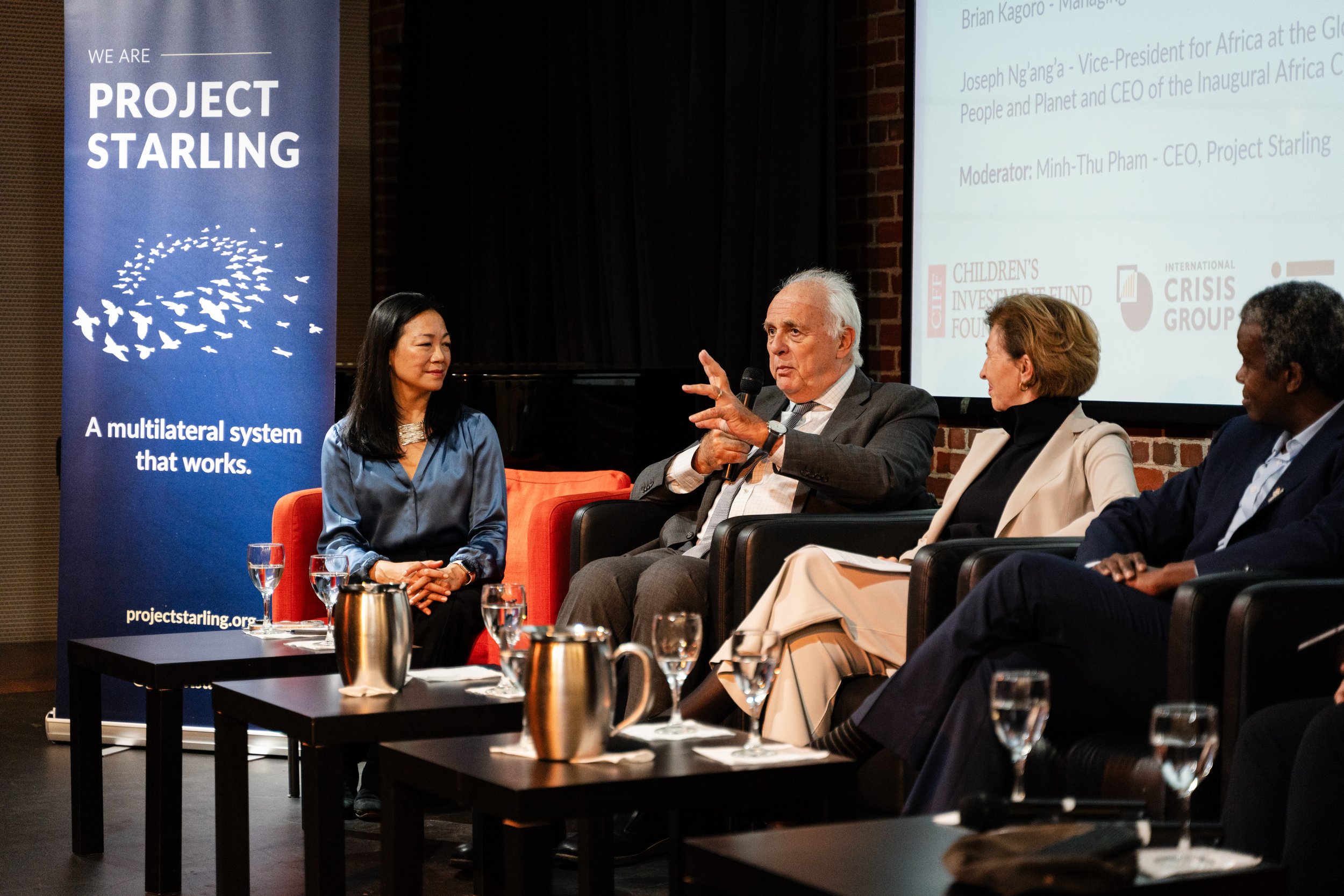
















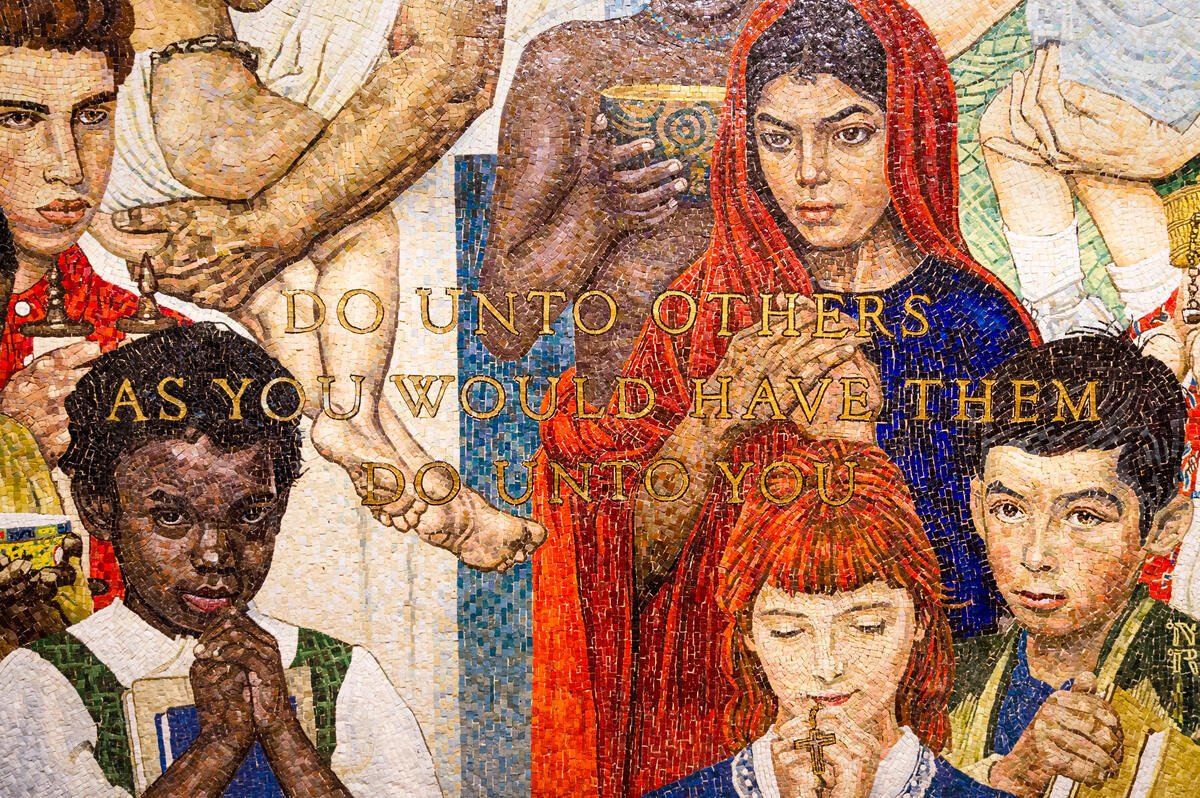
SUMMIT OF THE FUTURE Action Days Side Event: From Words to Action
SUMMIT OF THE FUTURE, Action Days Side Event, “From Words to Action: A Networked Approach to Enhancing Implementation of Commitments from the Pact of the Future



























